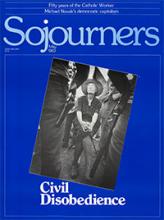The issues surrounding civil disobedience are as important as they are controversial. We offer in the following articles a substantial forum on these questions so that many voices can be heard. While there are differing opinions represented here as to the theology, purposes, tactics, and spirit of civil disobedience, all those who have been asked to contribute have demonstrated a biblical commitment to civil disobedience and speak out of their experience. - The Editors
Civil disobedience is the expression of a wider moral principle. The way Gandhi phrased it is: "Non-cooperation with evil is as much a duty as cooperation with good." This principle is morally and politically revolutionary. If understood and acted on by a growing number of Americans, non-cooperation with evil would destroy the basis in this country for nuclear war preparations.
Civil disobedience is especially powerful when it can serve as a catalyst for other acts of non-cooperation with evil, where its example of moral freedom is so clear and contagious that it can ignite the spirit of a larger community. This is how our Ground Zero community has sought to apply civil disobedience in our campaign around the Trident base whose fence our center shares. Our hope is that acts of loving disobedience, in the context of continuous dialogue, can help ignite the spirit of a larger community into non-cooperation with Trident. It is, in Gandhi's terms, an experiment in truth.
Read the Full Article

